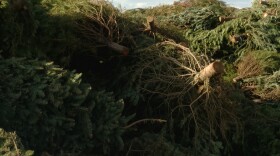ANDREA SEABROOK, host:
From NPR News, it's ALL THINGS CONSIDERED. I'm Andrea Seabrook.
China hasn't seen a disaster as bad as last week's earthquake in a generation. The official death toll has passed 33,000 and is still rising. If there's any bright spot amid all this suffering, it's the spirit of volunteerism and charity that has blossomed in China.
NPR's Anthony Kuhn reports from a devastated town in Sichuan Province.
ANTHONY KUHN: Just walking through the town of Han Wong(ph), you can tell that it used to be a really nice town. We're in a central square right now right near the bus station. There are nice Chinese-style pavilions and newspaper kiosks but there are no residents here now. It's all police and army and firemen.
Unidentified Man: (Chinese spoken)
KUHN: Nearby demolition experts clear the street before blowing up a dangerously unstable building.
(Soundbite of explosion)
KUHN: Down the street, 35-year-old Loa Jao(ph) watches a backhoe dig through piles of rubble. He sits on a chunk concrete wearing a hard hat and an orange vest. By his side is a big spray can of disinfectant. He recently signed up as a Red Cross volunteer and now he's waiting to do his job, which is to spray the corpses that rescue workers dig out of the rubble. Loa says that he felt he needed to put his Buddhist beliefs into action.
Mr. LOA JAO (Resident): (Through translator) When I saw on TV that things were like this, I felt that I couldn't just comfortably sit around at home. I had to come do something, both for the living and the dying. Even if I can't save the dying, I can comfort their souls.
KUHN: The groundswell of compassion is visible everywhere. Artists perform for charity, blood banks are brimming and the road to Han Wong is jammed with volunteers ferrying in supplies.
(Soundbite of car honking)
Unidentified Man #2: (Chinese spoken)
KUHN: Employees of the Wang Chow(ph) Kitchen Utensils Company are forming up a 13-car convoy to head into town. Their cars are loaded with tents, food and medicine. Company boss Wang Chow Wei(ph) offers up a common description of Chinese charity.
Mr. WANG CHOW WEI (Owner, Wang Chow Kitchen Utensils Company): (Chinese spoken)
KUHN: It's a tradition in China, he says, that when there's a disaster in one place people come to the rescue from all over. And this is not just in Sichuan. People from all over the country have given lots of assistance to Sichuan. Indeed, donors in China and abroad have given nearly a billion dollars to help disaster victims.
(Soundbite of truck engine)
KUHN: But this is a new situation for Chinese. Never before have they watched such a natural disaster on TV or been affluent enough to pool so much money. Graduate student Emily Ma wanted to go volunteer on the frontlines, but she has no rescue-related expertise. So, she's on the street in Chengdu today soliciting donations for the Red Cross and listening to quake-related radio reports.
People Emily's age have grown up amid the relative peace and prosperity of China's reform age, a far cry from the war and privation her parents and grandparents lived through. Emily says the earthquake has been a defining and enlightening moment for her.
Ms. EMILY MA (Graduate Student, Volunteer): (Through translator) When I watched those TV reports, I realize how fragile and cherishing life is. But it's a big country and a big world and there are always people suffering and in need in help but much of the time people don't have such a strong desire to help.
KUHN: Through millennia of authoritarian rule and hierarchical society, Chinese people felt responsibility towards the emperor or the family patriarch but never to society as a whole. Under communism, they were taught to rely on the all-encompassing Communist Party. Now it seems the earthquake is teaching them to rely on each other as never before.
Anthony Kuhn, NPR News, Han Wong township, Duyong(ph) City, Sichuan Province. Transcript provided by NPR, Copyright NPR.






